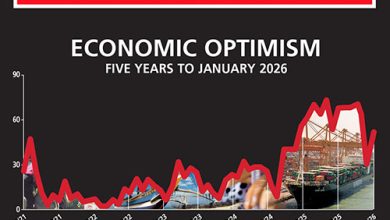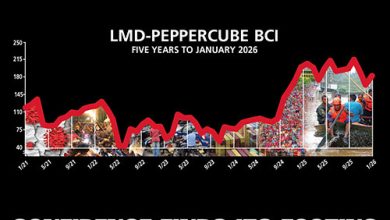BUSINESS SENTIMENT
In a dramatic move on 2 April, US President Donald Trump imposed a 44 percent tariff on goods from Sri Lanka and many other countries (ranging from 10% to 90%) through an executive order, citing it as a reciprocal measure to address trade imbalances.
TARIFF TURMOIL SHATTERS CONFIDENCE
Business confidence takes a nosedive leaving the recent record highs in the rearview mirror
Thankfully, a week later he decided to pause the tariff explosion for 90 days, subject to a baseline 10 percent levy across the board – except for China, which reciprocated with its own penalties for most things American.
The United States is one of Sri Lanka’s key export markets – in 2024 alone, Sri Lanka exported US$ 2.9 billion worth of goods to the US, accounting for 23 percent of the nation’s export earnings – a critical source of foreign income.
This development has raised concerns about potential economic repercussions including pressure on the Sri Lankan Rupee and fate of the apparel industry.
Meanwhile, while lauding Sri Lanka’s reform agenda backed by the Extended Fund Facility (EFF) for its continued delivery of commendable outcomes, the IMF cautioned that external shocks and ongoing developments are bringing uncertainty into a recovering economy.
The so-called lender of last resort said it needs more time to thoroughly assess the impact of the global shockwave and determine how its implications for Sri Lanka can be addressed within the framework of the IMF supported programme.
THE INDEX The LMD-PEPPERCUBE Business Confidence Index (BCI) fell substantially in April – following its record equalling high of 204 in February – shedding 25 basis points to settle at 172, from 197 in March.
Despite the decline however, the index remains 49 points above its historical median of 123 and 28 notches higher than the 12 month average of 144. For perspective, the barometer stood at a lowly 96 at the same time last year.
According to PepperCube Consultants, the free fall in confidence (the downgrade is the highest in a month since January 2022, when the economic crisis took root and the BCI shed 50 basis points) signals a marked shift in business sentiment, primarily driven by external headwinds such as the imposition of US tariffs and growing domestic dissatisfaction with Budget 2025.
PROJECTIONS As alluded to by us, in the past two months, the index failed to surpass its post-election all-time equalling high; and given the mounting challenges, a turnaround in the near term appears unlikely.
Much will depend on how the government navigates the unfolding US led trade war, prepares to counter any measures that the Trump administration takes when its pause ends in early July and addresses emerging questions about how it intends to deliver on a plethora of election promises.
Beyond the crossroads that the nation finds itself in once again, the outcome of the forthcoming provincial council elections and fate of the Sri Lankan Rupee will be on the watch list of the business community.
Against this backdrop, speculation and volatility are likely to dominate proceedings in the short term at least, possibly leading to a further erosion of the BCI.







